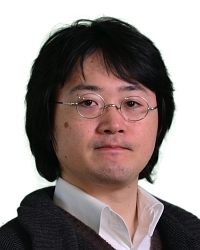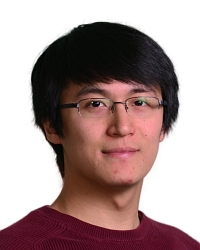TR2022-121
quEEGNet: Quantum AI for Biosignal Processing
-
- , "quEEGNet: Quantum AI for Biosignal Processing", IEEE Conference on Biomedical and Health Informatics (BHI), DOI: 10.1109/BHI56158.2022.9926814, September 2022.BibTeX TR2022-121 PDF Video Presentation
- @inproceedings{Koike-Akino2022sep,
- author = {Koike-Akino, Toshiaki and Wang, Ye},
- title = {{quEEGNet: Quantum AI for Biosignal Processing}},
- booktitle = {IEEE Conference on Biomedical and Health Informatics (BHI)},
- year = 2022,
- month = sep,
- publisher = {IEEE},
- doi = {10.1109/BHI56158.2022.9926814},
- issn = {2641-3604},
- isbn = {978-1-6654-8791-7},
- url = {https://www.merl.com/publications/TR2022-121}
- }
- , "quEEGNet: Quantum AI for Biosignal Processing", IEEE Conference on Biomedical and Health Informatics (BHI), DOI: 10.1109/BHI56158.2022.9926814, September 2022.
-
MERL Contacts:
-
Research Areas:
Artificial Intelligence, Machine Learning, Signal Processing
Abstract:
In this paper, we introduce an emerging quantum machine learning (QML) framework to assist classical deep learning methods for biosignal processing applications. Specif- ically, we propose a hybrid quantum-classical neural network model that integrates a variational quantum circuit (VQC) into a deep neural network (DNN) for electroencephalogram (EEG), electromyogram (EMG), and electrocorticogram (ECoG) analysis. We demonstrate that the proposed quantum neural network (QNN) achieves state-of-the-art performance while the number of trainable parameters is kept small for VQC.
Related News & Events
-
NEWS Toshiaki Koike-Akino to give a tutorial talk at ISIT 2025 Quantum Hackathon Date: June 22, 2025
Where: IEEE International Symposium on Information Theory (ISIT)
MERL Contact: Toshiaki Koike-Akino
Research Areas: Artificial Intelligence, Communications, Data Analytics, Machine Learning, Optimization, Signal Processing, Human-Computer Interaction, Information SecurityBrief- Toshiaki Koike-Akino is invited to present a tutorial talk at IEEE ISIT 2025 Quantum Hackathon, to be held at Ann Arbor, Michigan, USA. The talk, entitled "Emerging Quantum AI Technology", will discuss the recent trends, challenges, and applications of quantum artificial intelligence (QAI) technologies.
The ISIT 2025 Quantum Hackathon invites participants to explore the intersection of quantum computing and information theory. Participants will work with quantum simulators, available quantum hardware, and state-of-the-art development kits to create innovative solutions that connect quantum advancements with challenges in communication and signal processing.
The IEEE International Symposium on Information Theory (ISIT) is the flagship conference of the IEEE Information Theory Society. The symposium centers around the presentation in all of the areas of information theory, including source and channel coding, communication theory and systems, cryptography and security, detection and estimation, networks, pattern recognition and learning, statistics, stochastic processes and complexity, and signal processing.
- Toshiaki Koike-Akino is invited to present a tutorial talk at IEEE ISIT 2025 Quantum Hackathon, to be held at Ann Arbor, Michigan, USA. The talk, entitled "Emerging Quantum AI Technology", will discuss the recent trends, challenges, and applications of quantum artificial intelligence (QAI) technologies.
-
NEWS Toshiaki Koike-Akino to give a seminar talk at EPFL on quantum AI Date: May 22, 2024
MERL Contact: Toshiaki Koike-Akino
Research Areas: Artificial Intelligence, Machine LearningBrief- Toshiaki Koike-Akino is invited to present a seminar talk at EPFL, Switzerland. The talk, entitled "Post-Deep Learning: Emerging Quantum AI Technology", will discuss the recent trends, challenges, and applications of quantum machine learning (QML) technologies. The seminar is organized by Prof. Volkan Cevher and Prof. Giovanni De Micheli. The event invites students, researchers, scholars and professors through EPFL departments including School of Engineering, Communication Science, Life Science, Machine Learning and AI Center.
-
NEWS MERL Researchers give a Tutorial Talk on Quantum Machine Learning for Sensing and Communications at IEEE VCC Date: November 28, 2023 - November 30, 2023
Where: Virtual
MERL Contacts: Toshiaki Koike-Akino; Pu (Perry) Wang
Research Areas: Artificial Intelligence, Communications, Computational Sensing, Machine Learning, Signal ProcessingBrief- On November 28, 2023, MERL researchers Toshiaki Koike-Akino and Pu (Perry) Wang will give a 3-hour tutorial presentation at the first IEEE Virtual Conference on Communications (VCC). The talk, titled "Post-Deep Learning Era: Emerging Quantum Machine Learning for Sensing and Communications," addresses recent trends, challenges, and advances in sensing and communications. P. Wang presents use cases, industry trends, signal processing, and deep learning for Wi-Fi integrated sensing and communications (ISAC), while T. Koike-Akino discusses the future of deep learning, giving a comprehensive overview of artificial intelligence (AI) technologies, natural computing, emerging quantum AI, and their diverse applications. The tutorial is conducted virtually.
IEEE VCC is a new fully virtual conference launched from the IEEE Communications Society, gathering researchers from academia and industry who are unable to travel but wish to present their recent scientific results and engage in conducive interactive discussions with fellow researchers working in their fields. It is designed to resolve potential hardship such as pandemic restrictions, visa issues, travel problems, or financial difficulties.
- On November 28, 2023, MERL researchers Toshiaki Koike-Akino and Pu (Perry) Wang will give a 3-hour tutorial presentation at the first IEEE Virtual Conference on Communications (VCC). The talk, titled "Post-Deep Learning Era: Emerging Quantum Machine Learning for Sensing and Communications," addresses recent trends, challenges, and advances in sensing and communications. P. Wang presents use cases, industry trends, signal processing, and deep learning for Wi-Fi integrated sensing and communications (ISAC), while T. Koike-Akino discusses the future of deep learning, giving a comprehensive overview of artificial intelligence (AI) technologies, natural computing, emerging quantum AI, and their diverse applications. The tutorial is conducted virtually.
-
NEWS MERL Researchers gave a Tutorial Talk on Quantum Machine Learning for Sensing and Communications at IEEE GLOBECOM Date: December 8, 2022
MERL Contacts: Toshiaki Koike-Akino; Pu (Perry) Wang
Research Areas: Artificial Intelligence, Communications, Computational Sensing, Machine Learning, Signal ProcessingBrief- On December 8, 2022, MERL researchers Toshiaki Koike-Akino and Pu (Perry) Wang gave a 3.5-hour tutorial presentation at the IEEE Global Communications Conference (GLOBECOM). The talk, titled "Post-Deep Learning Era: Emerging Quantum Machine Learning for Sensing and Communications," addressed recent trends, challenges, and advances in sensing and communications. P. Wang presented on use cases, industry trends, signal processing, and deep learning for Wi-Fi integrated sensing and communications (ISAC), while T. Koike-Akino discussed the future of deep learning, giving a comprehensive overview of artificial intelligence (AI) technologies, natural computing, emerging quantum AI, and their diverse applications. The tutorial was conducted remotely. MERL's quantum AI technology was partly reported in the recent press release (https://us.mitsubishielectric.com/en/news/releases/global/2022/1202-a/index.html).
The IEEE GLOBECOM is a highly anticipated event for researchers and industry professionals in the field of communications. Organized by the IEEE Communications Society, the flagship conference is known for its focus on driving innovation in all aspects of the field. Each year, over 3,000 scientific researchers submit proposals for program sessions at the annual conference. The theme of this year's conference was "Accelerating the Digital Transformation through Smart Communications," and featured a comprehensive technical program with 13 symposia, various tutorials and workshops.
- On December 8, 2022, MERL researchers Toshiaki Koike-Akino and Pu (Perry) Wang gave a 3.5-hour tutorial presentation at the IEEE Global Communications Conference (GLOBECOM). The talk, titled "Post-Deep Learning Era: Emerging Quantum Machine Learning for Sensing and Communications," addressed recent trends, challenges, and advances in sensing and communications. P. Wang presented on use cases, industry trends, signal processing, and deep learning for Wi-Fi integrated sensing and communications (ISAC), while T. Koike-Akino discussed the future of deep learning, giving a comprehensive overview of artificial intelligence (AI) technologies, natural computing, emerging quantum AI, and their diverse applications. The tutorial was conducted remotely. MERL's quantum AI technology was partly reported in the recent press release (https://us.mitsubishielectric.com/en/news/releases/global/2022/1202-a/index.html).
-
NEWS MERL's Quantum Machine Learning Technology Featured in Mitsubishi Electric Corporation Press Release Date: December 2, 2022
MERL Contacts: Toshiaki Koike-Akino; Kieran Parsons; Pu (Perry) Wang; Ye Wang
Research Areas: Artificial Intelligence, Computational Sensing, Machine Learning, Signal Processing, Human-Computer InteractionBrief- Mitsubishi Electric Corporation announced its development of a quantum artificial intelligence (AI) technology that automatically optimizes inference models to downsize the scale of computation with quantum neural networks. The new quantum AI technology can be integrated with classical machine learning frameworks for diverse solutions.
Mitsubishi Electric has confirmed that the technology can be incorporated in the world's first applications for terahertz (THz) imaging, Wi-Fi indoor monitoring, compressed sensing, and brain-computer interfaces. The technology is based on recent research by MERL's Connectivity & Information Processing team and Computational Sensing team.
Mitsubishi Electric's new quantum machine learning (QML) technology realizes compact inference models by fully exploiting the enormous capacity of quantum computers to express exponentially larger-state space with the number of quantum bits (qubits). In a hybrid combination of both quantum and classical AI, the technology can compensate for limitations of classical AI to achieve superior performance while significantly downsizing the scale of AI models, even when using limited data.
- Mitsubishi Electric Corporation announced its development of a quantum artificial intelligence (AI) technology that automatically optimizes inference models to downsize the scale of computation with quantum neural networks. The new quantum AI technology can be integrated with classical machine learning frameworks for diverse solutions.

